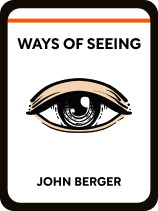

This article is an excerpt from the Shortform book guide to "Ways of Seeing" by John Berger. Shortform has the world's best summaries and analyses of books you should be reading.
Like this article? Sign up for a free trial here .
What is John Berger’s Ways of Seeing about? What are some of the most noteworthy passages worth revisiting?
Ways of Seeing is a collection of seven essays published in 1972. Art critic John Berger argues that the way we see art has been manipulated by a privileged few to maintain their dominance, socially and economically. He believes this has happened throughout history and asserts that it’s time for things to change.
Here’s a selection of John Berger’s Ways of Seeing quotes with explanations.
John Berger: Ways of Seeing Quotes
Ways of Seeing by John Berger is a short but dense work of art criticism that, using Marxist, feminist and post-colonial theory, skewered the traditional way of thinking about art as dictated by elite, usually wealthy art and cultural “experts.”
The following Ways of Seeing quotes by John Berger highlight some of his key ideas.
“Mystification has little to do with the vocabulary used. Mystification is the process of explaining away what might otherwise be evident.”
In Marxism, mystification refers to the intentional deceiving of the majority working class (proletariat) by the minority upper/middle class (bourgeoisie) to preserve their wealth. Berger takes this framework of mystification and applies it to the way art is critiqued and owned—particularly the idea that throughout history, art historians and the wealthy elite have obscured ideologies hidden within the art.
“All publicity works upon anxiety. The sum of everything is money, to get money is to overcome anxiety. Alternatively the anxiety on which publicity plays is the fear that having nothing you will be nothing.”
Every advertisement you see offers a different product or service, but Berger explains that they all promise the same thing: An improved life. By spending money on this or that, your life will become more fun, more relaxing, more convenient. You will improve as a person. Others will envy you and emulate you.
“Publicity turns consumption into a substitute for democracy.”
Democracy is built upon the premise of choice—we choose our representatives and our leaders, and thus have greater control over the decisions made for us. Advertisements offer an abundance of choice. So much so, Berger notes, that we move through our lives with a comfortable illusion of being in control. Any areas of society where democracy is failing is less obvious to us because we operate with the belief that we are making all of our own decisions.
”Nakedness reveals itself. Nudity is placed on display.”
Not all naked paintings are nudes. According to Berger, to be naked is to be yourself, and to be seen by others for who you are—it is vulnerability and honesty. To be nude, on the other hand, is to hide oneself and be seen by others as an object—usually for sexual fantasy.
“The real question is: to whom does the meaning of the art of the past properly belong? To those who can app|y it to their own lives, or to a cultural hierarchy of relic specialists?”
Ways of Seeing challenges the idea that, to understand and appreciate works of art, we need experts to “translate” them for us. Rather, Berger urges us to pull back the curtain and look at the images before us with our own eyes.

———End of Preview———
Like what you just read? Read the rest of the world's best book summary and analysis of John Berger's "Ways of Seeing" at Shortform .
Here's what you'll find in our full Ways of Seeing summary :
- Why we don't need experts to "translate" works of art for us
- How the dominant class uses art and art criticism to “mystify” the working class
- How our experiences and beliefs influence what we see






